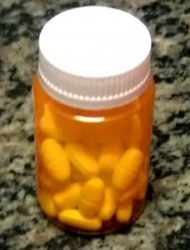Why Prescription Drug Costs Are So High
Posted by Mitch Mitchell on Feb 4, 2020
Everyone has had to get a prescription drug at some point. Whether it's first run or generic, the costs of pharmaceuticals are pretty high. Without insurance of some kind, at some point you'd never be able to afford the medication you need to take for your health.
 |
Many people lament the cost of these things; I understand why, but I'm not one of those people. I'm not because I know what goes into it, and frankly, I think we're probably safer, even if the costs can end up being astronomical. I'm going to give the basics of how it all works.
Say a national lab decides it wants to work on a drug that can help people with lung cancer. And let's say that there's not enough present information on what causes lung cancer. The first step is doing everything possible to learn as much about lung cancer as possible. They'll bring in experts, read tons of papers, and hope to identify the potential causes of lung cancer.
Next comes the work of figuring out what types of things are out there that might stem the tide of lung cancer. These could be animal based, plant based, or even something man-made that was for something else. It takes a lot of testing, and all that testing takes time and money. It can go as long as 7 to 10 years in testing before there's really anything they can decide to test on something living.
Yes, they've spent all this time testing on cells, but nothing alive. And where to they go most of the time? They start with mice and rats because they're inexpensive to test on. I know animal rights advocates hate hearing this but it's true. Be truthful, if it comes down to animal testing or your child dying which will you choose?
Anyway, it turns out that rats have a system that's comparable to ours, so they're good to test on. Once those trials are done, if things look good it's time to test on monkeys, who are the closest to us overall (by the way, man did NOT come from apes; that's a myth).
After all that testing is completed, and once again it can take years, it's time for human trials. This is where things get dicey because it's not always easy finding volunteers for these type of trials. The problem is that you can't give everyone the drug; you need to have a group that only thinks it's getting the drug so you can see whether it's really the drug doing the job or if it's the placebo effect of people thinking they have something that will help them. That sounds really cruel, but it's the only way scientists can determine its effectiveness.
After all this time and money and testing, all mandated by the governments of whichever country the company happens to be in, if all goes well the company gets to release their drug and make back all that money they spent. However, they only have a short period of time, 3 or 4 years, of exclusivity over their product. After that period, it gets to go out for bid, so to speak, and other companies get the science of it all and then get to create generics of that same thing.
For us, it means the price of pharmaceuticals comes down at a certain point, but for the laboratory that did all that work... well, hopefully they've made their money so they can move onto the next thing. Of course, on the back end they're going to have to fend off lawsuits because almost no drug affects everyone the same way. Some people are going to react badly to it, especially if it's for something big. The costs of lawsuits, successful or not, are extreme. They're going to pass on those expenses, and who do you think pays for that?
What's the other side? Labs could put out certain things as supplements, which is why we have all these plant based pills that promise they're going to cure all this stuff for us. Most of the testing is done by the people who put it out, and the regulations for testing aren't close to being what they are for pharmaceuticals.
These companies can make claims without proof that those claims are accurate; you pay your money, you take your chances. I was stunned when news came out that Omega-3 does NOT help with heart disease or MS, which it's always been touted to do, though it might help alleviate some other things.
Now... with that said, I acknowledge there are bad actors who take advantage of situations that are abhorrent. The cost of insulin keeps increasing, even though there are multiple makers of insulin that are similar to each other. There are medications that can help a small sample of people, but the cost of producing it is either cost prohibitive or they recognize the position they're in as the only hope for some potential clients. Like everything else in the world, there's good and bad companies throwing their weight around.
In any case, that's a very basic explanation of why the drugs you buy cost so much. You can still be mad, but at least be mad for the right reason. Here's a suggestion; try shopping around for the best price in your area. I do this all the time, and I pay the least amount possible.

